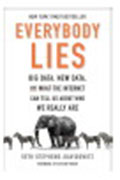EVERYBODY LIES: Big Data, New Data, and What the Internet Can Tell Us about Who We Really Are. Seth Stephens-Davidowitz. Foreword by Steven Pinker. Yes, everybody lies, and now we have ways of quantifying it. The author, a former Google data scientist, uses Google search tools, mainly Google Trends and Google AdWords, plus his own algorithm developed as his PhD dissertation, to study how frequently words or phrases are searched for in different locations and times. The results tell us things public opinion polls and other conventional tools can’t, some of them disturbing—like actually how and when many people search for racist terms (much more frequently than you’d think) and where they live, not just in the South but across parts of the East and upper Midwest east of the Mississippi. People reveal more about their sexual concerns in their online searches than in any polling. The revelations keep coming, he says, about mental illness, child abuse, abortion, religion, and health. We have an entirely new, enormous dataset that offers “surprising new perspectives” on all these fields. “Let me blunt,” says the author: “I am now convinced that Google searches are the most important dataset ever collected on the human psyche.” This book is the result of his mining that treasured dataset and many others: Facebook, Wikipedia, and others. The data are all anonymous but, when analyzed, extraordinarily revealing. Harper Collins, 2017, 338 pp., $27.99.

LEONARDO DA VINCI. Walter Isaacson. Today Leonardo seems best known for his Mona Lisa and The Last Supper paintings, but he was of course a highly original Renaissance genius of broad interests and deep curiosity who in everything he did combined art and science, an aesthetic sense with a desire to understand the most basic workings of nature. In this fresh and reader-friendly new biography, Walter Isaacson emphasizes the unique ways of thinking Leonardo brought to all of his work, with deep study and understanding of light, shadows, and optics, dissection of bodies to understand their underlying musculature, and study of the behavior of water, including eddies and vortexes. He made detailed, systematic observations and designed and carried out clever experiments. Isaacson examines each of Leonardo’s paintings and each of the topics Leonardo studied, showing his unique abilities to illustrate the inner workings of everything from complex machines to the anatomy, neurology, and physiology of the human body. His anatomical dissections and his studies of eddies in fluids enabled him to understand how the aortic valve works centuries before others reached the same insights. The paradox: In his hundreds of surviving notebooks totaling 7,200 pages, Leonardo documented all his studies, with beautiful and creative illustrations. But he didn’t publish any of this, leaving future generations to rediscover and appreciate his extraordinary insights. With color images of 144 of Leonardo’s drawings and paintings. Simon & Schuster, 2017, 599 pp., $35.
Leggete l'articolo completo e molti altri in questo numero di
Skeptical Inquirer
Opzioni di acquisto di seguito
Se il problema è vostro,
Accesso per leggere subito l'articolo completo.
Singolo numero digitale
Skeptical Inquirer March/April 2018
Questo numero e altri numeri arretrati non sono inclusi in un nuovo
abbonamento. Gli abbonamenti comprendono l'ultimo numero regolare e i nuovi numeri pubblicati durante l'abbonamento. Skeptical Inquirer
Abbonamento digitale annuale
€19,99
fatturati annualmente